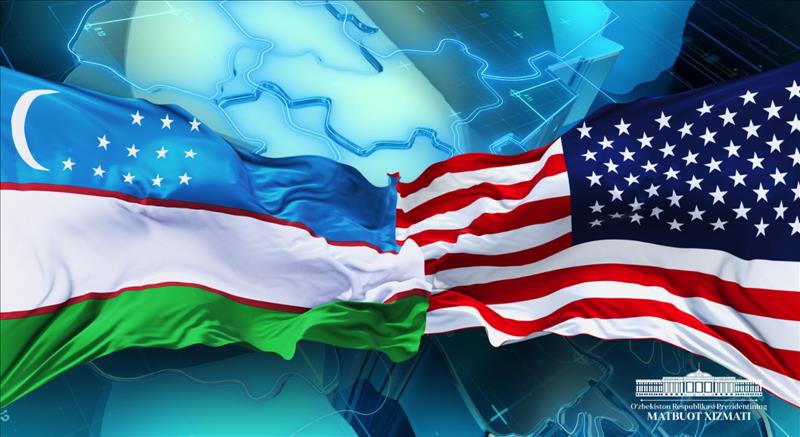U.S. Strategy In Central Asia. Why Washington Putting All Its Eggs In Uzbek Basket?
In this scenario, Uzbekistan holds a unique spot in the grand scheme of things. The country has become the largest recipient of US assistance in the region due to its advantageous location in the center of Central Asia and its proximity to unstable Afghanistan. For Washington, Tashkent is a key partner in security, infrastructure, energy, and trade. The U.S. views Uzbekistan as a stabilizer in the region and an important pillar of its long-term strategy.
A recent phone conversation between President Shavkat Mirziyoyev and U.S. President Donald Trump confirmed this approach. The American leader praised Uzbekistan's reforms, highlighting their irreversibility and focus on economic modernization. In response, Shavkat Mirziyoyev expressed gratitude for Washington's efforts to ensure regional and global stability and confirmed Uzbekistan's readiness to deepen its strategic partnership.
Economic cooperation remains the main driver of bilateral relations. By the end of 2024, trade turnover increased by 15 percent, reaching $881.7 million, while U.S. direct investment amounted to $612.6 million. Over 300 companies with American capital are already making waves in the country, including 167 that are flying the flag with 100 percent US ownership. Even though trade volumes took a hit in the first half of 2025, the U.S. still stands tall as one of Uzbekistan's key partners.
Big-ticket investment projects in the region are of utmost importance. Air Products company has invested over $1 billion in industrial gases and synthetic fuel production, with new investments potentially exceeding $10 billion. Discussions are also underway regarding cooperation in hydrogen energy, decarbonization, and the food industry. These projects set the course for industrial modernization in Uzbekistan and its integration into global production chains.
General Motors continues to steer the ship in the automotive sector, keeping the wheels turning with the production and export of equipment. Honeywell is throwing its hat into the ring with digital technologies in the industry and energy sectors. Pharmaceutical companies, like Pfizer, are rolling up their sleeves and joining forces to cook up cutting-edge medicines and vaccines.
An unusual but strategically important development is Uzbekistan's intention to start importing American cotton. At first glance, this may seem surprising, as the country has traditionally been a major exporter. However, importing high-quality raw materials will allow Uzbek textiles to strengthen their position in premium global markets, improve production technology, and attract new orders. Both local manufacturers and the state, which increases the export potential of the sector, will benefit.
Washington also supports institutional reforms. With the help of American experts funded by the U.S. Treasury, Uzbekistan is modernizing its financial sector and capital market, enhancing transparency and investor appeal. As a result, a special office to support American investments has been established within the Ministry of Investment and Foreign Trade.
“In recent years, Uzbekistan has made great strides in transitioning from a centralized economy to a market-based one. Laws protecting investments, including guarantees for foreign investors, have been adopted. The 2017 strategy, the 'New Uzbekistan 2022,' and 'Uzbekistan 2030' are vivid examples of this. We congratulate President Shavkat Mirziyoyev and his team for creating a reliable investment environment through reforms,” said Carolyn Lamm, Chair of the American-Uzbekistan Chamber of Commerce (AUCC), during the Uzbek-American Business Forum in Tashkent.
On this account, political cooperation is equally important. The U.S. actively assists Uzbekistan in its accession to the World Trade Organization. For Tashkent, this is a strategic step that will secure its position in global markets and attract more investment. American experts also support reforms in the financial sector, improving transparency and public administration efficiency. All of this strengthens investor confidence and accelerates economic integration.
However, there are still a few bumps in the road. The main risk is that the situation in Afghanistan could be a double-edged sword, potentially throwing a wrench in the works for both security and trade routes. The race for influence in Central Asia is heating up, with China, Russia, and the EU all throwing their hats into the ring. In these trying times, Tashkent has to walk a tightrope between various power players to reap the rewards.
For the U.S., cooperation with Uzbekistan is not only about investment and trade but also a part of its strategy to strengthen its regional position.
Today, it can be confidently stated that Uzbek-American cooperation is reaching a systemic level. It covers the economy, security, and political sphere, forming a long-term foundation for a strategic partnership. For Uzbekistan, this is an opportunity to accelerate reforms, modernize infrastructure, and strengthen its position as a key logistics and industrial hub in Central Asia. For the U.S., Tashkent is not only a reliable partner in ensuring regional stability but also a profitable economic ally, opening new opportunities for investment and trade.

Legal Disclaimer:
MENAFN provides the
information “as is” without warranty of any kind. We do not accept
any responsibility or liability for the accuracy, content, images,
videos, licenses, completeness, legality, or reliability of the information
contained in this article. If you have any complaints or copyright
issues related to this article, kindly contact the provider above.
Most popular stories
Market Research

- Kucoin Presents Kumining: Embodying Simple Mining, Smart Gains For Effortless Crypto Accumulation
- BILLY 'The Mascot Of BASE' Is Now Trading Live On BASE Chain
- Primexbt Launches Empowering Traders To Succeed Campaign, Leading A New Era Of Trading
- United States Animal Health Market Size, Industry Trends, Share, Growth And Report 2025-2033
- United States Lubricants Market Growth Opportunities & Share Dynamics 20252033
- Japan Buy Now Pay Later Market Size To Surpass USD 145.5 Billion By 2033 CAGR Of 22.23%






















Comments
No comment